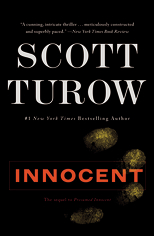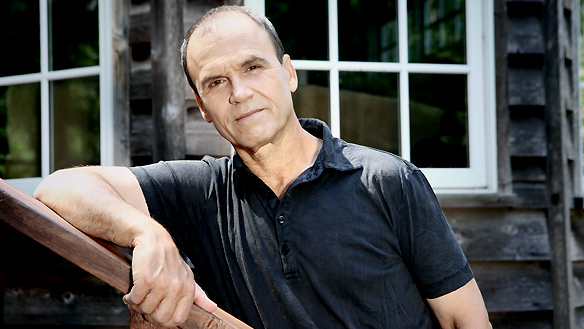 Synopsis:
Synopsis:
Twenty years have elapsed since Rusty Sabich stood trial for the murder of his colleague, Carolyn Polhemus, as detailed in Presumed Innocent. Following his acquittal, Rusty’s legal career again flourished — he is the Chief Justice of the Third District Appellate Court in Kindle Count and a candidate for a seat on the state Supreme Court. At the age of sixty, Rusty remains married to Barbara, although their marriage has been anything but peaceful or, at least for Rusty, satisfying. Following his trial, Rusty and Barbara separated but her ongoing emotional fragility and psychological instability forced Rusty to return to the marriage in order to protect Nat, who is about to graduate from law school. Married thirty-six years now, Barbara, a brilliant mathematician and professor, continues to struggle with bipolar disorder and depression.
As the story opens, Barbara is dead and Rusty has spent a full twenty-four hours in their home with her body before calling Nat with the news. He has failed to contact the authorities. It appears that Barbara committed suicide, but Rusty’s old nemesis, prosecutor Tommy Molto, is convinced by his chief deputy, Jim Brand, that there is more to Barbara’s death than the initial inquiry reveals. Molto has never fully recovered from the embarrassment of not convicting Rusty the first time around and is determined not to screw up again. Still, the opportunity to finally nail Rusty is tempting and he allows himself to be convinced that Rusty poisoned Barbara using her own medication.
Whether Rusty is a murderer or not, he has a few character defects. For one, he has again engaged in an extramarital dalliance, this time with a beautiful, and extremely ambitious thirty-four-year-old law clerk on his staff, Anna Vostic, even though he knew the affair could only end badly on every level. There is also the matter of a momentary breach of judicial ethics which, if revealed, would derail his career.
When Rusty is charged with Barbara’s murder, he again turns to Alejandro “Sandy” Stern, the elegant and articulate defense strategist who secured his acquittal so long ago. Now older and battling lung cancer, Sandy’s daughter, Marta, joins Rusty’s legal team.
Did Rusty concoct an elaborate scheme to murder Barbara and make her death look like a suicide?
Review:

There are plenty of contemporary authors who can craft a compelling, suspenseful legal mystery. And there are at least an equal number of writers who pen masterful psychological dramas in which they explore characters’ inner demons and relationships with each other. But for readers who want a mesmerizing, captivating blend of the two genres, there is none more skillful than Scott Turow. He is among my very favorite authors, largely because of his masterful 1987 novel, Presumed Innocent, and the highly successful sequel, Innocent, which is one of the five best books I read in 2011.
Rusty Sabich is again on trial for his life. He rebounded professionally after his acquittal, achieving his goal of being a judge. He is on the verge of attaining the highest pinnacle of legal success — his election to the state Supreme Court seems assured. But Rusty is, like all of us, a flawed human being, driven by the experiences and events that have made him the sixty-year-old man he is as the story begins unfolding with the death of his wife, Barbara. Why would an appellate justice, of all people, wait a full day before calling the authorities upon waking to find his body’s body in bed next to him? That’s the question his son Nat, now twenty-eight years of age and nearing the completion of his own legal education, asks him when Rusty finally calls to inform him of his mother’s death. And from there, Turow takes his readers on a legal and psychological thrill-ride punctuated with familiar characters and plot twists that keep the most astute readers guessing. Turow has ratcheted up the suspense through the introduction of technological aspects such as emails, Web searches, & computer tampering, but the heart of the story again beats in the chest of the complex, exasperating, but completely compelling character of Rusty Sabich.
Turow’s dialogue is crisp, his descriptions of legal maneuvering authentically spot-on. He never insults his readers by lecturing them about the fine points of the law. Rather, he demonstrates the legal principles intelligently and through meticulously plotted courtroom or investigative action. Turow plainly understands that American readers are fascinated by legal thrillers and fairly sophisticated, able to comprehend legal nuances. His technique is appreciated by legal professionals and lay readers alike. “I think that the way I do this is still a little bit different [from other writers],” he observes, “because I’m still anchored in the real procedure. I don’t want to cut corners with the rules of evidence. And that allows me to write about the nuances, things like the back and forth between lawyers before the judge takes the bench. Because I’m not trying to force a reality, I can do that.”
Where Turow really shines, however, is his searing, unflinching character studies, the fictional Rusty Sabich being a crowning achievement. He has attained his professional goals and is about to achieve the pinnacle of jurisprudence. So why does he risk everything by engaging in a completely inappropriate tryst with the much-younger Anna? What aspect of his life experiences to date drive Rusty to remain with Barbara when a staggering catalogue of resentment, anger, broken promises, and uncomfortable silences separate them? Why can’t Rusty simply walk away from his troubled and wife and the life they have shared? Turow deftly plumbs the depths of Rusty’s heart, a place where confusion sometimes reigns, causing him to make what appear to be completely self-destructive choices even though he is a man who, at his core, finds himself bound by honor, duty, and, somewhat surprisingly, genuine love and affection for the troubled mother of his child.
Many readers will think, as did I, that they have solved the mystery long before the book’s end. Many will be wrong, as was I, several times. Turow clearly delights in constructing a tale full of legal conundrums and injected with misleading clues. “I just take a primitive satisfaction in suspense and in the sort of post-modern reality of being the author who is sometimes winking at the reader. When I figured out the ultimate twist at the end of Innocent, I ran around the house hugging myself because of the way that twist interweaves with Presumed Innocent,” he says. Reading Presumed Innocent is strongly recommended before tackling Innocent in order to get the full import of Rusty Sabich’s journey, as well as experience Turow’s interim growth as a master of the genre. Turow is among the few authors whose books I will read simply because they were written by him. He is that good. Innocent receives my very highest and most enthusiastic recommendation.




1 Comment
I actually listened to the audio of this one and WISHED I had the book in print – the story was compelling, but the narration was lacking in emotion and depth. In spite of this, I had to keep listening to find out what happened. 🙂